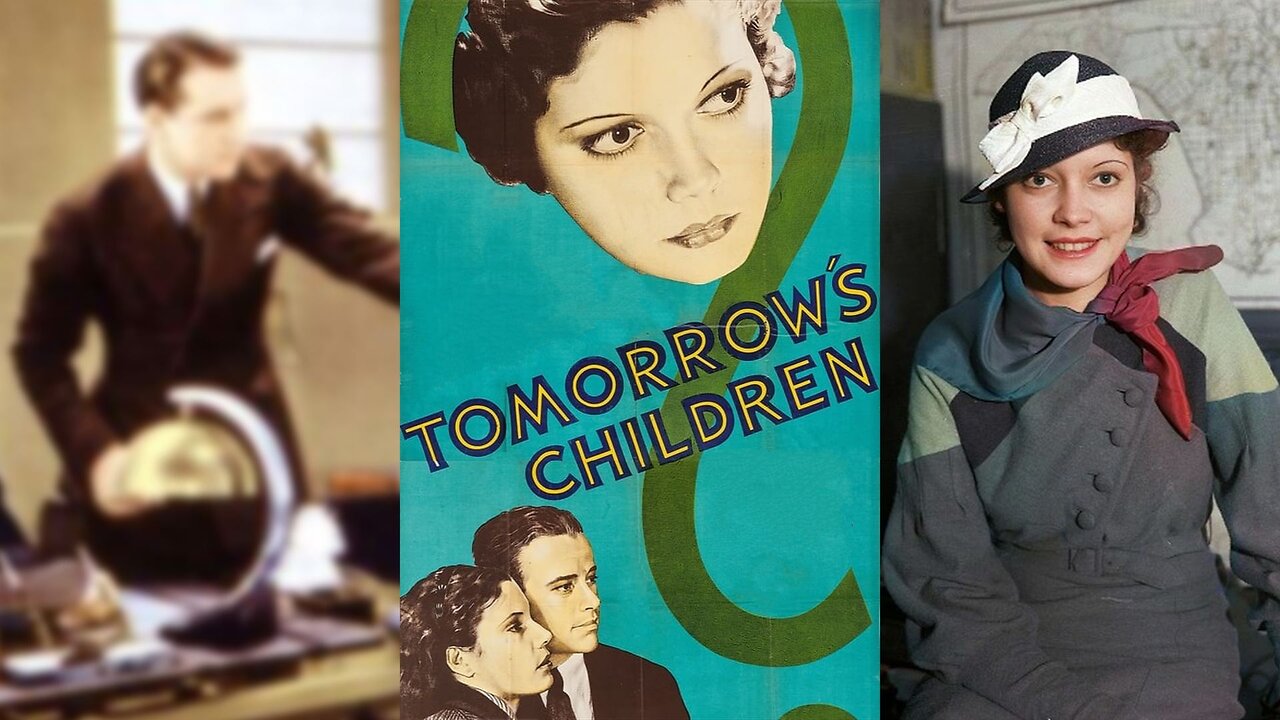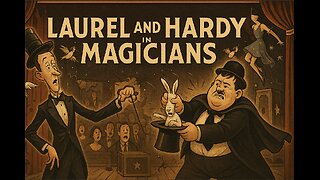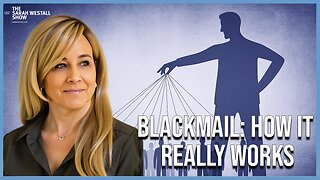Premium Only Content

TOMORROW'S CHILDREN (1934) Diane Sinclair, Donald Douglas & John Preston | Drama | B&W
Tomorrow's Children, also known as The Unborn in the United Kingdom, is a 1934 American drama film directed by Crane Wilbur. The film partially criticizes the eugenic policies in practice in the United States during those times. The film was widely deemed "immoral" and "tending to incite crime".
SYNOPSIS
A young woman wishes to marry her boyfriend and raise a family, but because her own family has been deemed "defective" by the state health authorities--her parents are lazy alcoholics who continue to have children, and her brothers are crippled, have mental problems or are jailed--she is ordered by a court to undergo sterilization so that her family's "defective genes" won't be passed on to any more children. Her boyfriend and a kindly priest desperately search for a way to stop the forced sterilization before it's too late.
The film follows the nature vs. nurture story of Alice Mason, played by Diane Sinclair, who wants nothing more than to settle down with her fiancé Jim and raise a family. This goal crumbles when her parents are forced to undergo sterilization or lose their welfare checks. Alice represents the only real beneficial family member; her aging parents are lazy alcoholics and her siblings have physical and mental disabilities, or criminal ties. But she is told that she too must be sterilized, as their family's corrupt bloodline must end.
Alice's parents grudgingly accept the court order, but she flees the house. Unfortunately, the police soon catch her. Her fiancé Jim makes a bold case to Dr. Brooks, who testifies on Alice's behalf, but it doesn't change the court's decision. Meanwhile, another ally of Alice and Jim, Father O'Brien (played by director Crane Wilbur), begs Mrs. Mason to reconsider the sterilization decision. She refuses, desperate to keep receiving welfare, but she becomes so drunk that she reveals that Alice was a foundling the Masons took in, so she actually isn't of their blood.
CAST & CREW
Diane Sinclair as Alice Mason
Donald Douglas as Dr. Brooks
John Preston as Dr. Crosby
Carlyle Moore Jr. as Jim Baker
Sterling Holloway as Dr. Dorsey
W. Messenger Bellis as Dr. McIntyre
Hyram A. Hoover as Spike
Constance Kent as Nurse
Lewis Gambart as Jeff
Crane Wilbur as Father O'Brien
Arthur Wanzer as Mr. Mason
Sarah Padden as Mrs. Mason
Directed by Crane Wilbur
Written by Wallace Thurman
Produced by Bryan Foy
Cinematography William C. Thompson
Edited by Arthur Hilton
Color process Black and white
Production company Foy Productions Ltd.
Release date July 1934
Running time 50 minutes
Country United States
Language English
NOTES
The film was the sound film directorial debut of Crane Wilbur. The film industry revolved around certain formulas and general rules for what was okay to talk about. Some producers tested and pushed the limits of society to promote new ideas, however, those who create these hard pressing issues are not members of the Association of Motion Picture Producers. Instead of being backed by this organization, the Foy Productions was forced to present the film to state censorship boards located in New York, Ohio, Kansas, Pennsylvania, Virginia, and Maryland.
The film received a lot of negative attention for its prominent themes of genetic alcoholism, deformed offspring, and sterilization. The film was only approved in Pennsylvania and Ohio.[2] Since Tomorrow’s Children deliberately ignored the standard rules of the industry, of leaving these controversial topics alone, the film was denied its license and there was a lot of effort devoted to the delaying of its production. The Producers’ Association was responsible for most of the obstacles in the film’s course.[3]
The original decision to ban the film came from Censor Irwin Esmond and Dr. Frank Graves in the State Education department. The Appellate Division of the Supreme Court backed Esmond and Graves with 3 votes in favor of the ban and 2 against it. Years later in 1938, Foy Productions urged the US appeals court to revisit “Tomorrow’s Children”, especially in New York. Frederick Crane, of the appeals court, screened the film along with 6 others to decide its future in the empire state.
The film has a very prominent theme of sterilization, or the loss of the ability to reproduce that eliminates the chance of parentage and future offspring. In the early 20th century, the US was flooded with ideals revolving around eugenics.
In 1927, the United States declared that it is in favor of these eugenic processes. Supreme Court Justice, Oliver Wendell Holmes, wrote, “...society can prevent those who are manifestly unfit from continuing their kind.” This quote would be later used against the U.S. during the Nazi Nuremberg trials. Because the film is a reflection on the evils of society, it went against the status quo and took a stand. Criticizing sterilization and eugenic activities also meant criticizing the standard thought in American culture.
#oldmovies #freemovies #drama #blackandwhite #lostandfoundfilms
-
 6:21
6:21
Lost n Found Films
22 hours agoMAGICIANS (1929) Stan Laurel, Oliver Hardy | Slapstick, Comedy | Short
38 -
 LIVE
LIVE
Robert Gouveia
1 hour agoCongress HAMMERS Epstein Files! Maxwell APPEAL Decision! Obama Suspects LAWYER UP! 14th Amendment!
1,122 watching -
 LIVE
LIVE
Barry Cunningham
3 hours agoPRESIDENT TRUMP TOURS JEROME POWELL SCENE OF THE CRIME AT THE FEDERAL RESERVE
1,937 watching -

Sarah Westall
2 hours agoBlackmail, Power & Corruption: The Currency of the Empire - Epstein & more w/ Joachim Hagopian
5.75K4 -
 16:33
16:33
Clownfish TV
7 hours agoLate Night TV Has NO FUTURE After Stephen Colbert's Cancellation!
7517 -
 45:56
45:56
The White House
3 hours agoPresident Trump Visits the Federal Reserve
19.2K19 -
 36:14
36:14
Kimberly Guilfoyle
4 hours agoRussia Hoax Reality Check, Live! | Ep240
17.5K10 -
 11:02
11:02
Preston Stewart
7 hours ago $0.18 earnedThailand–Cambodia Clash Erupts
3.5K3 -
 LIVE
LIVE
LFA TV
21 hours agoLFA TV ALL DAY STREAM - THURSDAY 7/24/25
1,054 watching -
 1:07:35
1:07:35
vivafrei
4 hours agoWall Street Journal DOUBLING DOWN on Epstein! Lawyer in Canada DEBANKED! AND MORE!
99.6K33